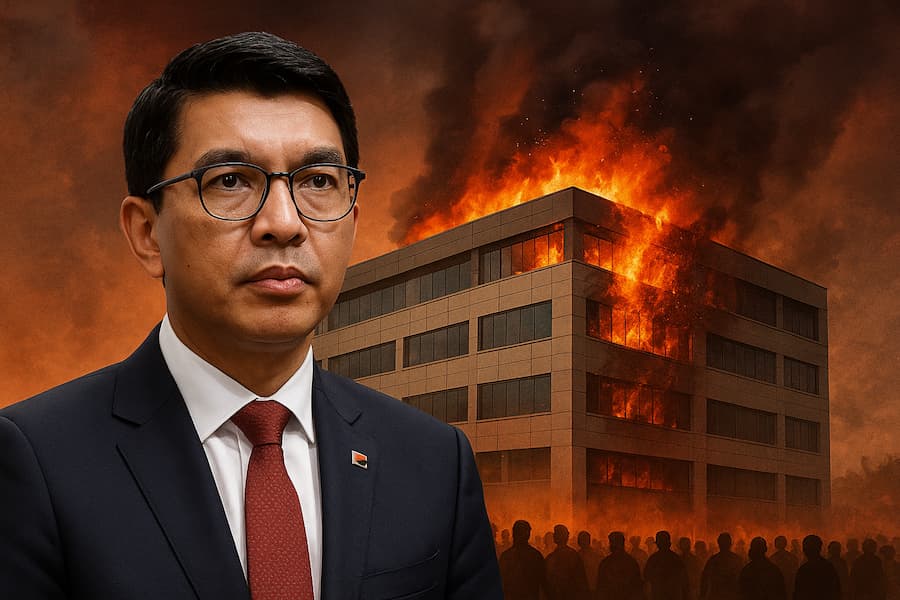
The political and business worlds of Madagascar collided when the head office of a company linked to President Andry Rajoelina was violently sacked. This unprecedented attack raised alarm across the nation, sparking debates on political stability, economic trust, and the fragile relationship between leadership and the private sector. Here are five shocking reasons behind this dramatic event.
At the center of the incident lies the growing tension between political elites and opposition groups. Andry Rajoelina, as both a business leader and the President of Madagascar, represents authority on multiple fronts. The attack on his company’s headquarters is seen by many as a symbolic strike against his dominance, a message of resistance from those who feel excluded from power.
Madagascar has faced increasing economic hardship in recent years, with inflation and unemployment hitting ordinary citizens the hardest. For some, the success of Andry Rajoelina’s private ventures is a reminder of inequality, fueling resentment. The sacking of the company’s HQ may have been an explosive outlet for this frustration, representing public anger against perceived privilege and corruption.
The headquarters of any company is more than just an office; it is a symbol of strength and influence. Targeting the HQ of a business tied to Andry Rajoelina carries a clear political message. By striking at the heart of his corporate presence, attackers aimed to weaken both his image as a leader and his authority as a businessman, blurring the lines between politics and economics.
Reports suggest that internal conflicts within Andry Rajoelina’s company may have contributed to the violent attack. Power struggles between executives, disputes over strategic decisions, and dissatisfaction among staff created vulnerabilities that external actors exploited. Understanding these internal tensions helps explain why the headquarters became a target in the first place.
The sacking of the HQ cannot be seen purely as a business issue. Madagascar’s complex political landscape plays a crucial role. Opposition parties and activist groups have been vocal about corruption and lack of transparency in enterprises linked to the presidency. The violent incident reflects the intense external pressures Andry Rajoelina faces from political adversaries who seek to challenge his influence.
Media coverage amplified the impact of the attack, shaping public perception. News outlets portrayed the event as a direct confrontation against Andry Rajoelina’s authority, drawing both national and international attention. This publicity adds pressure on the president and his business network, highlighting the critical role media plays in political and corporate crises. For detailed analysis on political crises in Madagascar, see BBC Africa Reports.
The attack on Andry Rajoelina’s company headquarters also affected local communities. Employees, suppliers, and nearby businesses experienced disruption and insecurity. The incident sent shockwaves through the local economy, illustrating how political or corporate conflicts can ripple outward, impacting everyday people who rely on stable business operations for their livelihoods.
Authorities responded quickly to investigate the sacking of the HQ. Law enforcement agencies launched inquiries into both the perpetrators and the underlying causes. Andry Rajoelina’s dual role as a president and business leader adds complexity to the legal proceedings, highlighting the intersection of governance, corporate responsibility, and law enforcement in Madagascar. For more detailed coverage on political and corporate issues in Madagascar, visit Africa Pulse Media.
The incident has not gone unnoticed on the international stage. Foreign investors and diplomatic missions are closely monitoring Madagascar’s stability and the safety of its business environment. The violent attack on a high-profile company linked to the president raises questions about political risk and the protection of foreign investments, influencing global perceptions of Madagascar’s economic climate.
The sacking of Andry Rajoelina’s company headquarters in Madagascar highlights the complex interplay between politics, business, and public perception. From internal rivalries to external pressures, the event serves as a stark reminder of how leadership and corporate influence can attract both admiration and opposition. Protecting stability, fostering transparency, and addressing societal grievances are crucial steps to prevent such dramatic incidents in the future.